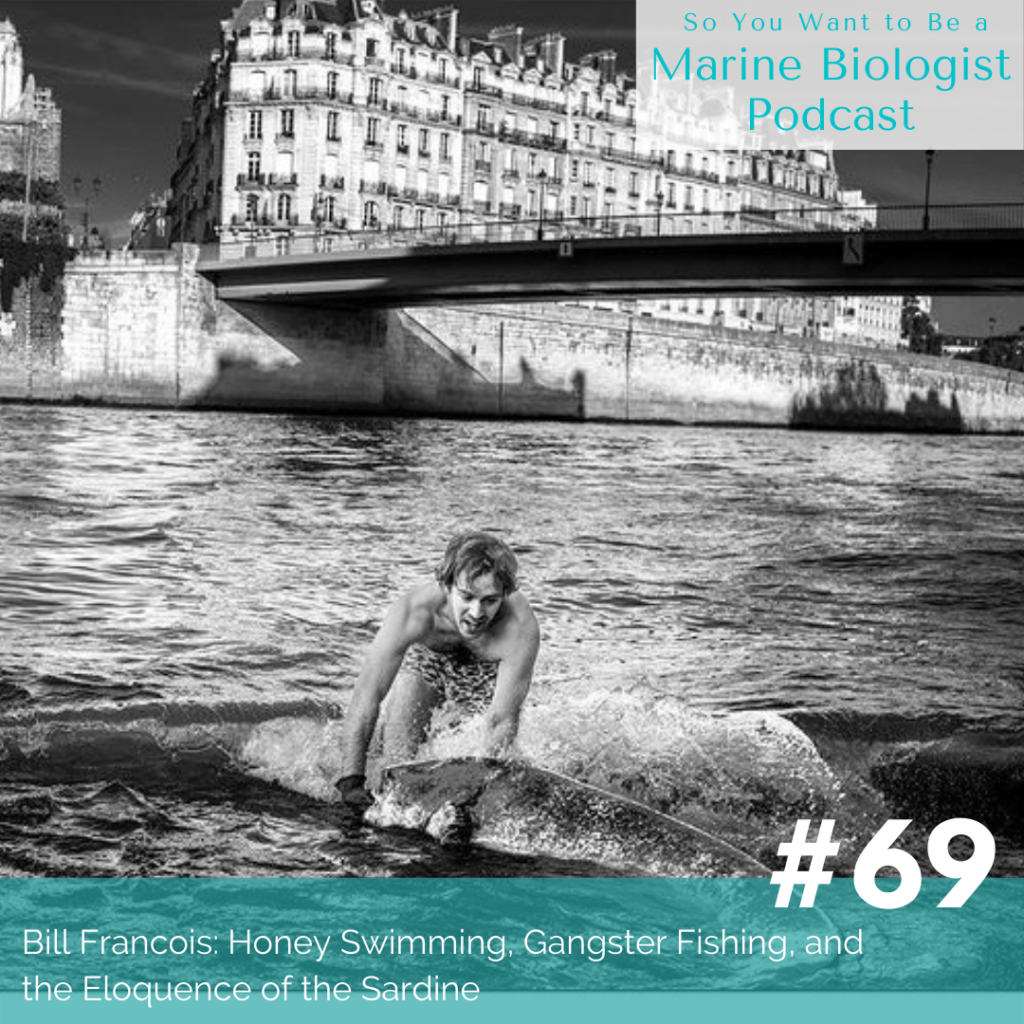Bill Francois is a physicist, marine scientist, fisherman, and author. In his premiere book, Eloquence of the Sardine, Bill dives into the world of mythology, legends, and basic science, bringing to life fascinating stories from the underwater realm. In today’s show, Bill shares how he won a National French show competition and the prize of a book deal. Bill also shares the correct catch and release methods, how whales prevent themselves from cooking on a daily basis, how larval fish swim through honey, and soo much more.
Connect with Bill: Instagram
Quick Links
Eloquence of the Sardine
Hidden Wonders: The Subtle Dialogue Between Physics and Elegance
Hydrodynamics
Collective motion
Friday Harbor in Washington
Shiner perch
Zebra fish
Zebra fish larvae
Swordfish larvae
Dogfish and spiny dogfish
Bill’s podcast
Lungfish
Street fishing
Catfish in the Seine/Street fishing
French gendarmes
Mobula ray
Keep Fish Wet website
Show Notes
5:57 – Kara and Bill discuss the elegance of everyday small things.
6:55 – What prompted Bill to study hydrodynamics?
9:10 – Kara and Bill discuss how we don’t know how much we don’t know when it comes to what’s left to discover about the ocean and what’s still out there. Bill says, “I think it gives a lot of hope to the scientist, to keep that in mind.”
10:23 – Bill dives deep into what specifically he studied when it comes to fish hydrodynamics, in particular, two specific aspects that are linked together. These aspects are: the effect of size on fish hydrodynamics (gait and type of locomotion) and the effect of fish size on collective motion. Keeping these two aspects in mind, Bill studied leadership in pairs of fish.
14:13 – When studying zebrafish, Bill mostly researched how the way these fish swim changes as they age. Zebrafish are born out of eggs that are a few millimeters in size, and eventually grow to a few centimeters. That may not sound like much, but this growth is comparable to an organism growing from the weight of a mouse to the weight of an elephant.
16:14 – Bill elaborates on what swimming is like for baby fish. He relates the experience to the feeling of swimming in a pool full of honey – the water is that viscous to a baby fish. This, as you can imagine, makes things difficult for them, including breathing. They actually begin life breathing through their skin instead of their gills.
17:43: Size effects mean that when an object (or organism) is very small, its surface is very big in comparison to its mass. Bill discusses how this affects tiny warm-blooded shrews, as well as how the alternative affects whales.
23:23 – Bill explains some of the similarities between the fish he studied in the United States and the ones he studied in France.
26:36 – Bill was on a TV show while he was getting a PhD. Bill is very impressed that Kara found this out.
30:33 – Bill tells the behind-the-scenes story of how “Eloquence” became part of the title of his book.
33:27 – The drawings in Bill’s book are his own, including the drawing on the cover!
34:56 – Kara and Bill talk podcasts. Bill hosts one all in French, the name of which translates to “Little fish will become podcasts,” inspired by a common French saying. Each episode is short and focuses on a specific aspect of marine life.
38:00 – What do fishermen living in Paris do? They go street fishing, of course. Bill explains what exactly street fishing is and shares entertaining stories from his own experiences fishing this way.
51:09 – What does the ocean mean to Bill? “I think it’s the last place on Earth that allows me to dream of something new.”
52:11 – If Bill was given a blank check to use however he wanted, what would he use it for? Bill says this is a difficult question, because he wants to use it both to follow his own curiosity (like on a project studying spearfish), but also thinks he would need to spend it on something “more useful for the big stakes the sea ecosystems face today.”
54:00 – Parisian gendarmes have chased Bill more than once.
58:13 – One of Bill’s favorite field stories is from when he was tagging tune in the Mediterranean Sea. It involves a Mobula ray.
59:26 – Bill shares some good catch-and-release tips for the listeners.
1:03:29 – Two asks for the audience: When you go out into nature, bring something you can use to pick up any plastic and trash you find. The second is to remember that we are part of the food chain.
1:06:04 – Bill shares how listeners can connect with him.
